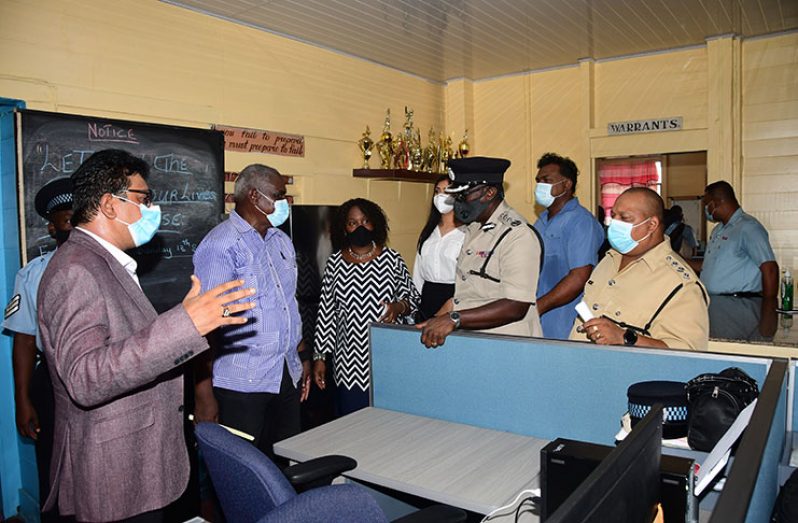— prison population occupancy level at 137.5 per cent
OVER the next two years, government will be addressing pre-trial detention and non-custodial measures, rehabilitation programmes for drug users, restorative justice programmes and sentencing guidelines, along with a series of legislative initiatives.
This is according to Attorney-General (AG) and Legal Affairs Minister, Mohabir Anil Nandlall, during a handing over ceremony on Saturday at the Brickdam Police Station.
The minister handed over a number of furnishings, equipment and other devices, as well as various law books for the court superintendent office at the said location, as part of the Inter-American Development Bank (IDAB)-funded project, “Support for the Criminal Justice System Program (SCJS).”
Government, he said, will also be looking at institutional strengthening of the probation service, community service programme and trainings.
The Support for the Criminal Justice System Programme of the Ministry of Legal Affairs is an Inter-American Development Bank-funded Programme, which has, as its objective, the reduction of the prison population in Guyana.
Minister Nandlall said recent research shows that Guyana has a prison population rate of 264 per 100,000 of national population, which significantly surpasses the world average.
The most recent available figure, he said, is at June 2019, and this shows that the occupancy level of the prison population is 137.5 per cent.
The attorney-general said there is persuasive evidence to suggest that the escalating incidence of incarceration is directly related to the over-reliance of the criminal justice system on incarceration as an effective tool for addressing deviant conduct.
Although the laws of Guyana provide for a limited range of alternative sentencing options, Nandlall said these measures are scarcely utilised and are compounded further by the incapacity of the criminal justice system to adequately employ those alternative options.
As the programme unfolds, he said he will continue to work closely with a number of stakeholders to collaboratively attain the reformation of the criminal justice system.
Stakeholders, he said, include the judiciary, the magistracy, the Ministry of Human Services and Social Security, the Guyana Prison Service, the Guyana Police Force (GPF) and the Chambers of the Director of Public Prosecutions (DPP), among others.
The legal affairs minister said the collective input of these stakeholders coupled with research and necessity, has resulted in many measures and activities, which will all culminate in addressing the general problem of prison overcrowding.
TWO-WAY STREET
Underscoring that the criminal justice system is a two-way street, Minister Nandlall said on one hand, there is the defendant or the accused and on the other hand, there is the victim.
“While the crime may be committed against the victim, personally, it is a crime against the State. The victim’s interest is also the public interest. Criminal justice is about balancing these competing interests. On the one hand, the defendant or the accused is presumed innocent, and the State must prove his guilt. He is guaranteed a fair trial as a constitutional right. On the other hand, the victim and by extension the public’s interest must also be protected. The State’s interest must also be canvased fairly before the court,” the attorney-general explained.
This function, he said, is performed by the prosecution and it is fundamental to balancing these competing interests in ensuring that each side is adequately represented in that adversarial system.
“One of the activities embraced by this programme is the strengthening of the prosecutorial arm of the State. This component of the programme is aimed at enhancing the Chambers of the DPP as well as the Prosecutor’s Office of the GPF. It is this component of the programme that we celebrate today,” the attorney-general said.
The programme, the minister said, in its quest to strengthen the prosecutorial arm of the State has given support to the Office of the DPP and the GPF, both at Brickdam and at New Amsterdam, Berbice.
Further, Minister Nandlall explained that the programme supported civil works at Brickdam, which commenced in January of 2020 and concluded in June of 2020.
He said the works included the provision of construction services, namely rehabilitation, electrical installation, plumbing installation and painting.
Similarly, at the Prosecutor’s Office located at Berbice, the programme is privileged to also support the rehabilitation of that office along with the provision of electrical, plumbing and painting services.
The DPP Chambers also acquired support to bolster provision of its services.




.png)









